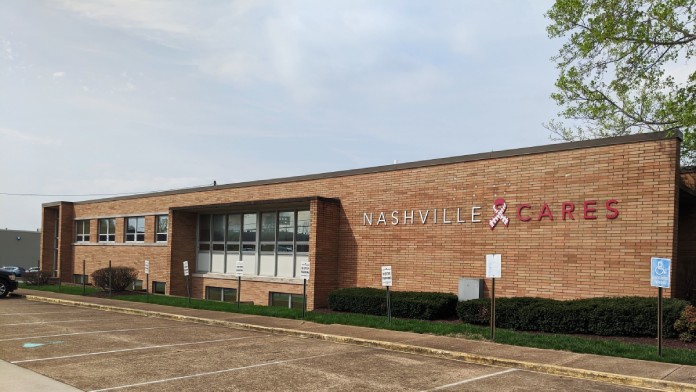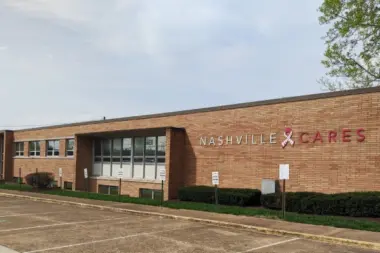This place and the people working on it showed me the path to a fully recovered life, my experience was completely positive and I wouldn't change it for anything. I highly recommend this place to everyone out there seeking for real help.
About Nashville CARES
Since 1985, Nashville CARES has supported Tennesseans living with HIV/AIDS through targeted education, free and confidential HIV testing and case management. Individuals living with HIV/AIDS may also struggle with underlying substance use and co-occurring mental health challenges. Nashville CARES can address these intersecting challenges through integrated care that combines medical support, substance use counseling and mental health services.
Nashville CARES is licensed by the Tennessee Department of Mental Health & Substance Abuse Services to provide evidence-based counseling. The organization is headquartered along Thompson Lane in Nashville, Tennessee not far from Sevier Park and Belmont Mansion. This main campus serves as the central hub for accessing all of their services.
HIV/HCV Testing For Intravenous Drug Users
Intravenous drug users are typically at a higher risk of being infected with HIV or HCV. Nashville CARES offers HIV/Hepatitis C (HCV) testing with results available to clients within minutes.
Those who test positive for HIV are quickly connected to antiretroviral therapy to begin treatment without delay. The clinic is also a trusted source for Pre-Exposure (PrEP) and Post-Exposure (PEP) Prophylaxis therapy.
Integrated Substance Use Care & Harm Reduction Services
Nashville CARES offers evidence-based and trauma-informed outpatient therapy in group and individual settings regardless of your HIV status. Therapeutic support focuses on helping you build emotional resilience, manage stress and develop healthier coping strategies for long-term well-being.
Psychiatric support such as medication management is also provided as part of integrated care to address co-occurring mental health challenges and promote general wellness. Clients can receive broad harm reduction services, including access to Narcan, fentanyl test strips and safe disposal for used syringes.
Latest Reviews
Rehab Score
Gallery


Other Forms of Payment
Addiction Treatments
Levels of Care
Outpatient Programs (OP) are for those seeking mental rehab or drug rehab, but who also stay at home every night. The main difference between outpatient treatment (OP) and intensive outpatient treatment (IOP) lies in the amount of hours the patient spends at the facility. Most of the time an outpatient program is designed for someone who has completed an inpatient stay and is looking to continue their growth in recovery. Outpatient is not meant to be the starting point, it is commonly referred to as aftercare.
Drug and alcohol addiction often takes a heavy toll on one's body. Over time, a physical dependence can develop, meaning the body physiologically needs the substance to function. Detox is the process of removing drugs and/or alcohol from the body, a process that can be lethal if mismanaged. Medical detox is done by licensed medical professionals who monitor vital signs and keep you safe, healthy, and as comfortable as possible as you go through detox and withdrawal.
Treatments
The goal of treatment for alcoholism is abstinence. Those with poor social support, poor motivation, or psychiatric disorders tend to relapse within a few years of treatment. For these people, success is measured by longer periods of abstinence, reduced use of alcohol, better health, and improved social functioning. Recovery and Maintenance are usually based on 12 step programs and AA meetings.
When your day-to-day life is taken over by drug use, this is known as substance use disorder. If you abruptly stop using your drug of choice, you experience withdrawal symptoms. To overcome this cycle, professional drug rehab in Tennessee is usually needed.
A combined mental health and substance abuse rehab has the staff and resources available to handle individuals with both mental health and substance abuse issues. It can be challenging to determine where a specific symptom stems from (a mental health issue or an issue related to substance abuse), so mental health and substance abuse professionals are helpful in detangling symptoms and keeping treatment on track.
Opioid rehabs specialize in supporting those recovering from opioid addiction. They treat those suffering from addiction to illegal opioids like heroin, as well as prescription drugs like oxycodone. These centers typically combine both physical as well as mental and emotional support to help stop addiction. Physical support often includes medical detox and subsequent medical support (including medication), and mental support includes in-depth therapy to address the underlying causes of addiction.
Programs
Adult rehab programs include therapies tailored to each client's specific needs, goals, and recovery progress. They are tailored to the specific challenges adult clients may face, including family and work pressures and commitments. From inpatient and residential treatment to various levels of outpatient services, there are many options available. Some facilities also help adults work through co-occurring conditions, like anxiety, that can accompany addiction.
Young adulthood can be an exciting, yet difficult, time of transition. Individuals in their late teens to mid-20s face unique stressors related to school, jobs, families, and social circles, which can lead to a rise in substance use. Rehab centers with dedicated young adult programs will include activities and amenities that cater to this age group, with an emphasis on specialized counseling, peer socialization, and ongoing aftercare.
Clinical Services
Whether a marriage or other committed relationship, an intimate partnership is one of the most important aspects of a person's life. Drug and alcohol addiction affects both members of a couple in deep and meaningful ways, as does rehab and recovery. Couples therapy and other couples-focused treatment programs are significant parts of exploring triggers of addiction, as well as learning how to build healthy patterns to support ongoing sobriety.
Research clearly demonstrates that recovery is far more successful and sustainable when loved ones like family members participate in rehab and substance abuse treatment. Genetic factors may be at play when it comes to drug and alcohol addiction, as well as mental health issues. Family dynamics often play a critical role in addiction triggers, and if properly educated, family members can be a strong source of support when it comes to rehabilitation.
Group therapy is any therapeutic work that happens in a group (not one-on-one). There are a number of different group therapy modalities, including support groups, experiential therapy, psycho-education, and more. Group therapy involves treatment as well as processing interaction between group members.
In individual therapy, a patient meets one-on-one with a trained psychologist or counselor. Therapy is a pivotal part of effective substance abuse treatment, as it often covers root causes of addiction, including challenges faced by the patient in their social, family, and work/school life.
Staff

Kara A. Rauscher, LCSW
Therapist

Chenxi Zhu, LPC-MHSP (Temp)
Counselor

Lily Catalano, LCSW
Therapist

Dr.Kassem Bourgi
Medical Director
Contact Information
633 thompson Lane
Nashville, TN 37204